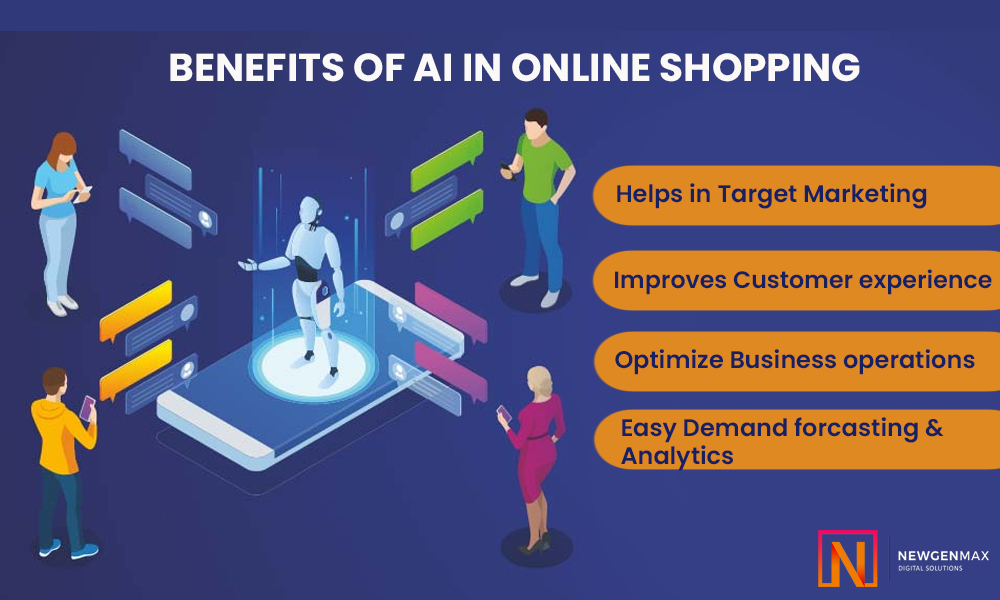Introduction
The eCommerce industry is experiencing rapid growth in today’s digital age, revolutionizing how people shop. With the rise of artificial intelligence (AI), online retailers can now offer personalized shopping experiences like never before. AI algorithms can analyze vast amounts of data and provide tailored recommendations, transforming how we interact with online stores. In this article, we will explore the role of AI in eCommerce, focusing on how it redefines personalization in online shopping.

Table of Contents
- Introduction
- The Role of AI in Personalization
- Benefits of AI-Powered Personalization in Online Shopping
- AI-Driven Recommendation Engines
- AI-Powered Chatbots for Customer Support
- Virtual Shopping Assistants and Personalized Product Recommendations
- AI and Predictive Analytics in E-Commerce
- The Future of AI in eCommerce
- Challenges and Ethical Considerations of AI in eCommerce
- Conclusion
The Role of AI in Personalization
Personalization has become a crucial aspect of online shopping, as consumers expect tailored experiences and recommendations that suit their preferences. AI plays a significant role in making this possible. By leveraging machine learning algorithms, AI systems can analyze customer data, such as browsing history, purchase behaviour, and demographic information, to offer personalized product recommendations. This level of personalization enhances the shopping experience for customers and increases sales and customer loyalty for online retailers.

Benefits of AI-Powered Personalization in Online Shopping
Integrating AI-powered personalization in online shopping brings numerous benefits for customers and retailers. Firstly, customers can enjoy a more streamlined and efficient shopping experience. AI algorithms can analyze customer data in real time, instantly providing recommendations that match their preferences. This saves customers time and effort searching for products and increases their satisfaction with online shopping.
For retailers, AI-powered personalization offers a competitive advantage by improving customer engagement and increasing conversion rates. By understanding customer preferences and behaviour, retailers can optimize their product offerings, pricing, and marketing strategies. This leads to higher sales and customer retention rates, ultimately driving business growth.
AI-Driven Recommendation Engines
One of the most prominent applications of AI in E-Commerce is using recommendation engines. These intelligent systems analyze customer data to provide personalized product recommendations based on individual preferences. Recommendation engines consider previous purchases, browsing history, and social media activity to offer relevant and enticing suggestions.
AI-driven recommendation engines have proven highly effective in increasing customer engagement and driving sales. The more accurate the recommendations, the more likely customers are to purchase. By leveraging AI algorithms, online retailers can improve the accuracy and relevance of their recommendations, resulting in higher conversion rates and customer satisfaction.
Read More : Top AI trends for 2024
AI-Powered Chatbots for Customer Support
Another area where AI redefines personalization in eCommerce is using chatbots for customer support. AI-powered chatbots are designed to mimic human conversation and provide instant customer assistance. Using natural language processing (NLP) algorithms, chatbots can understand and respond to customer queries in real time, offering personalized and efficient support.
AI-powered chatbots are available 24/7, ensuring round-the-clock customer support. They can handle various inquiries, from product information to order tracking, providing instant and accurate responses. This improves customer satisfaction and reduces the workload on customer support teams, allowing them to focus on more complex queries.
Virtual Shopping Assistants and Personalized Product Recommendations
Virtual shopping assistants are another AI-driven technology transforming the online shopping experience. These virtual assistants use AI algorithms to interact with customers, helping them find products that match their preferences. By understanding customer needs and preferences, virtual shopping assistants can provide personalized recommendations and guide customers throughout their shopping journey.
Virtual shopping assistants can engage customers in a conversation, asking questions about their preferences and offering tailored suggestions based on their responses. This level of personalization enhances the customer experience and increases the likelihood of purchasing. By leveraging AI, online retailers can create a more personalized and interactive shopping experience, mirroring the assistance provided by in-store sales associates.

AI and Predictive Analytics in E-Commerce
Predictive analytics is an essential component of AI in E-Commerce. By analyzing historical and real-time data, AI algorithms can predict customer behaviour and preferences, enabling retailers to make data-driven decisions. Predictive analytics can help retailers forecast demand, optimize inventory management, and personalize marketing campaigns.
By leveraging AI and predictive analytics, online retailers can anticipate customer needs and proactively offer personalized recommendations and promotions. This level of personalization not only improves customer satisfaction but also increases sales and customer loyalty. Retailers can also optimize their supply chain and inventory management, reducing costs and improving efficiency.
The Future of AI in eCommerce
The Future of AI in e-commerce looks promising, with continuous advancements in machine learning and data analytics. AI will continue to play a crucial role in personalization, enabling online retailers to offer tailored experiences that cater to individual preferences. Personalization will only increase as AI algorithms become more sophisticated and can process complex data sets.
Additionally, AI will enhance other aspects of the E-Commerce industry, such as fraud detection and prevention, customer service automation, and voice-activated shopping. With the integration of AI technologies, the E-Commerce industry will continue to evolve, providing more efficient and personalized customer experiences.
Challenges and Ethical Considerations of AI in eCommerce
While AI brings numerous benefits to the eCommerce industry, challenges and ethical considerations need to be addressed. One of the main challenges is the potential bias in AI algorithms. If not properly trained and tested, AI algorithms can perpetuate existing biases and discrimination, leading to unfair treatment of specific customer groups.
Privacy is another ethical concern when it comes to AI in E-Commerce. AI systems rely on vast amounts of customer data, which raises questions about data security and consent. Retailers must ensure that customer data is protected and used responsibly, adhering to privacy regulations and obtaining explicit consent for data usage.
Conclusion
In conclusion, integrating AI in eCommerce is revolutionizing how we shop online. AI-powered personalization offers numerous benefits for both customers and retailers. From recommendation engines to chatbots and virtual shopping assistants, AI technologies enhance the shopping experience by providing tailored recommendations, efficient customer support, and interactive assistance.
As AI continues to advance, the Future of e-commerce looks promising. However, addressing the challenges and ethical considerations associated with AI is crucial, ensuring that it is used responsibly and does not perpetuate biases or compromise customer privacy. By leveraging AI thoughtfully and ethically, online retailers can create a more personalized and engaging shopping experience, setting themselves apart in the competitive eCommerce landscape.
Latest Post:
-
Smart Home Appliances in the UAE: Revolutionizing Modern Living
The UAE has long been recognized as a hub for innovation and technological advancement, and the adoption of smart home appliances is no exception. As the nation embraces the concept of smart homes, residents are experiencing a transformation in their daily lives, characterized by increased convenience, efficiency, and sustainability. This article explores how smart home…
-
(Artificial Intelligence) AI and ML (Machine Learning) : Transforming the Future
Artificial Intelligence (AI) and Machine Learning (ML) are two of the most transformative technologies of our time. They are reshaping industries, driving innovation, and opening up new possibilities in ways previously unimaginable. This article explores the fundamentals of AI and ML, their applications, and their profound impact on various sectors. Understanding Artificial Intelligence (AI) What…
-
Digital Marketing Services: Transforming Your Business in the Digital Age
In today’s digital-first world, businesses must leverage digital marketing services to remain competitive, attract customers, and drive growth. Digital marketing encompasses a broad range of tactics and strategies aimed at promoting products or services through digital channels. This article delves into the various types of digital marketing services available, their benefits, and how businesses can…




